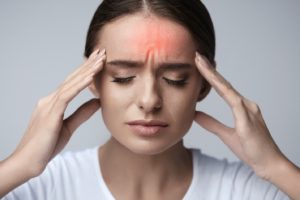
Few things can ruin your day like a headache. The pain can make it difficult to concentrate at work, downgrade your mood, and even prevent you from enjoying your favorite activities. While there are countless possible causes for headaches, one possible culprit is TMJ disorder, which is otherwise known as TMD. It often causes muscle pain and tension throughout the entire craniofacial area. Let’s talk about some signs that indicate your head pain may be a result of TMD.
Your Jaw Pops or Clicks
Joints throughout the body should function seamlessly and silently. Clicking and popping in the jaw are telltale signs that something is off with your TMJ. You shouldn’t ignore these sounds even if they aren’t accompanied by any immediate pain in the vicinity of your jaw.
Your Bite Feels Off
Occlusion is a word that refers how the teeth fit together. Malocclusion, problems with your bite, can place unnecessary strain on the TMJ and lead to TMD symptoms. Overbite, underbite, and crossbite are just a few examples of occlusion issues that can affect your jaw’s health and function.
You Have Aches and Pains in Other Parts of Your Body
TMD can cause muscle tension in the forehead and temple areas that leads to headaches. However, you must keep in mind that the human body is a complex network, full of interconnected systems. It is common for TMD to contribute to muscle pain throughout the body, including the neck, back, and shoulders.
You Have Forward Head Posture
When you are sitting or standing upright, your head should be above your shoulders. If it is in front of our shoulders, you have what is known as forward head posture. This condition is also called “nerd neck” because it often afflicts people who spend a lot of time looking at a computer screen or wearing a heavy backpack. Forward head posture can place much strain on the muscles around your TMJ and contribute to headaches.
You Snore
Snoring indicates that your upper airway has minor obstructions that hinder the free flow of air while you sleep. Such obstructions are often the result of improper jaw positioning, which can cause TMD.
How to Find Relief
The best way to address TMJ-related headaches is to consult with a dentist who is qualified to diagnose and treat TMD. After a careful evaluation, they may recommend orthodontic treatment, a custom oral appliance, certain stretches and exercises, or other therapies that will relieve the muscle tension that is causing your headaches.
Do you suspect that TMD is responsible for your headaches? Instead of masking the pain with medication, seek help from a doctor who can address the cause of your pain and guide you toward long-lasting relief.
About the Author
Dr. Amin Mason is a board-certified orthodontist who is proud to serve patients throughout the Columbus area. He has undergone extensive training that equips him to provide personalized, effective TMJ therapy. To learn more about Dr. Mason and how he may be able to help you reduce the number of headaches you experience, contact our office at 614-781-6990.


